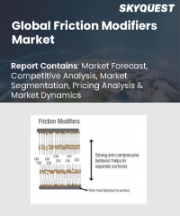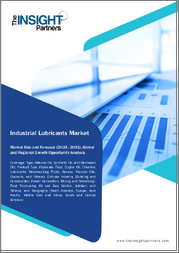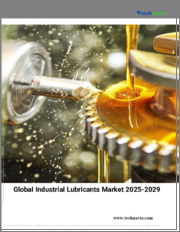
|
시장보고서
상품코드
1635803
산업용 윤활유 시장 : 세계 산업 분석, 규모, 점유율, 성장, 동향, 예측(2025-2032년)Industrial Lubricants Market: Global Industry Analysis, Size, Share, Growth, Trends, and Forecast, 2025 - 2032 |
||||||
Persistence Market Research는 최근 2025년부터 2032년까지의 산업용 윤활유 시장에 대한 종합적인 보고서를 발표했으며, 주요 시장 역학, 추진 요인, 동향, 기회, 과제 등 주요 시장 역학에 대해 자세히 분석했습니다. 이 보고서는 시장 상황에 대한 귀중한 인사이트를 제공하고 이해관계자들의 의사결정을 촉진할 수 있도록 돕습니다.
주요 인사이트
- 산업용 윤활유 시장 규모(2025년) : 751억 650만 달러
- 예상 시장 규모(2032년) : 972억 3,400만 달러
- 세계 시장 성장률(CAGR, 2025-2032년) : 3.8%
산업용 윤활유 시장 - 보고서 범위:
산업용 윤활유 시장에는 석유 및 가스, 건설, 금속 및 광업 등 다양한 산업에 필수적인 다양한 윤활유 제품이 포함됩니다. 이러한 윤활유는 마찰을 최소화하고 마모와 손상을 줄이며, 산업 기계 및 장비의 전반적인 작동 효율을 높이는 데 중요한 역할을 합니다. 이 시장은 산업화의 발전, 인프라 개발, 윤활유 배합의 기술적 진보에 의해 주도되고 있습니다.
시장 성장 촉진요인:
제조 산업의 확대, 에너지 효율적인 윤활유에 대한 수요 증가, 지속가능한 관행을 촉진하는 엄격한 규제 등 여러 가지 요인이 세계 산업용 윤활유 시장의 성장을 촉진하고 있습니다. 또한, 특정 산업 요구 사항을 충족하기 위한 윤활유 첨가제 및 배합의 기술 혁신도 시장 성장의 원동력이 되고 있습니다. 또한, 인프라 프로젝트 및 자동차 산업에 대한 투자 증가는 산업용 윤활유 수요에 기여하고 있습니다.
시장 억제요인:
산업용 윤활유 시장은 성장 전망에도 불구하고 원자재 가격 변동, 윤활유 폐기물에 대한 환경 문제, 대체 에너지로의 전환과 같은 도전에 직면해 있습니다. 또한, 산업 활동에 영향을 미치는 경기 침체와 다양한 산업 응용 분야에 대한 윤활유 선택의 복잡성은 시장 참여자들에게 도전이 되고 있습니다. 이러한 장애물을 극복하기 위해서는 전략적 가격 책정, 제품 혁신, 환경 기준 준수가 필요합니다.
시장 기회:
산업용 윤활유 시장은 우수한 성능과 환경적 이점을 제공하는 바이오 기반 및 합성유와 같은 윤활유 기술의 발전으로 인해 기회를 창출하고 있습니다. 신흥 시장에서의 확장, 인프라 투자, 산업 자동화 채택은 시장 성장의 길을 열어줄 것입니다. 제품 포트폴리오를 확장하고 판매망을 강화하기 위한 전략적 파트너십, 합병 및 인수합병도 시장 플레이어에게 유리한 기회를 제공하고 있습니다.
본 보고서에서 다루는 주요 질문들
- 세계 산업용 윤활유 시장의 성장을 촉진하는 주요 요인은 무엇인가?
- 산업용 윤활유 채택을 주도하는 산업 분야와 지역은 어디인가?
- 윤활제 배합의 기술 발전은 어떻게 경쟁 구도를 형성하고 있는가?
- 산업용 윤활유 시장의 주요 기업은 어디에 있으며, 시장 지위를 유지하기 위해 어떤 전략을 취하고 있는가?
- 세계 산업용 윤활유 시장의 새로운 트렌드와 전망은?
목차
제1장 주요 요약
제2장 시장 개요
- 시장 범위와 정의
- 시장 역학
- 성장 촉진요인
- 성장 억제요인
- 기회
- 과제
- 주요 동향
- 제품 유형 수명주기 분석
- 산업용 윤활유 시장 : 밸류체인
- 원료 기유 공급업체 리스트
- 제조업체 리스트
- 판매대리점 리스트
- 애플리케이션 리스트
- 수익성 분석
- Porter’s Five Forces 분석
- 지정학적 긴장 : 시장에 대한 영향
- 거시경제 요인
- 세계의 부문별 전망
- 세계의 GDP 성장 전망
- 세계의 상부 시장 개요
- 예측요인 - 관련성과 영향
- 규제와 테크놀러지 상황
제3장 세계의 산업용 윤활유 시장 전망 : 실적(2019-2023년)과 예측(2025-2032년)
- 주요 하이라이트
- 시장 수량(단위) 예측
- 시장 규모와 전년비 성장률
- 절대액 기회
- 시장 규모(백만 달러) 분석과 예측
- 과거 시장 규모 분석, 2019-2023년
- 현재 시장 규모 예측, 2025-2032년
- 세계의 산업용 윤활유 시장 전망 : 제품 유형
- 소개/주요 조사 결과
- 과거 시장 규모(백만 달러)와 수량(단위) 분석 : 제품 유형별, 2019-2023년
- 현재 시장 규모(백만 달러)와 수량(단위) 예측 : 제품 유형별, 2025-2032년
- 컴프레서 오일
- 터빈 오일
- 유압작동유
- 금속가공유
- 기어 오일
- 그리스
- 변압기유
- 냉동기유
- 섬유 기계용 윤활유
- 기타
- 시장 매력 분석 : 제품 유형
- 세계의 산업용 윤활유 시장 전망 : 기유
- 소개/주요 조사 결과
- 과거 시장 규모(백만 달러)와 수량(단위) 분석 : 베이스오일별, 2019-2023년
- 현재 시장 규모(백만 달러)와 수량(단위) 예측 : 베이스오일별, 2025-2032년
- 광유
- 합성유
- 바이오 기반 오일
- 시장 매력 분석 : 기유
- 세계의 산업용 윤활유 시장 전망 : 최종 이용 산업
- 소개/주요 조사 결과
- 과거 시장 규모(백만 달러)와 수량(단위) 분석 : 최종 이용 산업별, 2019-2023년
- 현재 시장 규모(백만 달러)와 수량(단위) 예측 : 최종 이용 산업별, 2025-2032년
- 석유 및 가스
- 건설
- 금속·광업
- 시멘트 생산
- 발전
- 화학제품 제조
- 섬유 제조
- 식품 가공
- 농업
- 펄프·제지
- 해양 용도
- 기타
- 시장 매력 분석 : 최종 이용 산업
제4장 세계의 산업용 윤활유 시장 전망 : 지역
- 주요 하이라이트
- 과거 시장 규모(백만 달러)와 수량(단위) 분석 : 지역별, 2019-2023년
- 현재 시장 규모(백만 달러)와 수량(단위) 예측 : 지역, 2025-2032년
- 북미
- 유럽
- 동아시아
- 남아시아 및 오세아니아
- 라틴아메리카
- 중동 및 아프리카(MEA)
- 시장 매력 분석 : 지역
제5장 북미의 산업용 윤활유 시장 전망 : 실적(2019-2023년)과 예측(2025-2032년)
제6장 유럽의 산업용 윤활유 시장 전망 : 실적(2019-2023년)과 예측(2025-2032년)
제7장 동아시아의 산업용 윤활유 시장 전망 : 실적(2019-2023년)과 예측(2025-2032년)
제8장 남아시아 및 오세아니아의 산업용 윤활유 시장 전망 : 실적(2019-2023년)과 예측(2025-2032년)
제9장 라틴아메리카의 산업용 윤활유 시장 전망 : 실적(2019-2023년)과 예측(2025-2032년)
제10장 중동 및 아프리카의 산업용 윤활유 시장 전망 : 실적(2019-2023년)과 예측(2025-2032년)
제11장 경쟁 구도
- 시장 점유율 분석, 2024년
- 시장 구조
- 경쟁 강도 매핑 : 시장별
- 경쟁, 아날로그 IC
- 겉보기 제품 용량
- 기업 개요(상세 - 개요, 재무, 전략, 최근 동향)
- ExxonMobil Corp.
- Fuchs Lubricants
- Shell Plc.
- Total SA
- BP Plc.
- Philips 66
- Clariant AG
- Chevron Corp.
- Volvoline International Inc.
- Gazprom
- Lukoil
- Rosneft
제12장 부록
- 조사 방법
- 조사 가정
- 두문자어와 약어
Persistence Market Research has recently released a comprehensive report on the Industrial Lubricants Market 2025-2032, providing an in-depth analysis of key market dynamics, including drivers, trends, opportunities, and challenges. This report offers valuable insights into the market landscape, facilitating informed decision-making for stakeholders.
Key Insights:
- Industrial Lubricants Market Size (2025E): USD 75,106.5 Mn
- Projected Market Value (2032F): USD 97,234.0 Mn
- Global Market Growth Rate (CAGR 2025 to 2032): 3.8%
Industrial Lubricants Market - Report Scope:
The Industrial Lubricants market encompasses a wide range of lubrication products essential for various industries, including oil & gas, construction, metal & mining, and more. These lubricants play a crucial role in minimizing friction, reducing wear and tear, and enhancing operational efficiency across industrial machinery and equipment. The market is driven by the growing industrialization, infrastructure development, and technological advancements in lubricant formulations.
Market Growth Drivers:
Several factors propel the growth of the global Industrial Lubricants market, including the expansion of manufacturing sectors, increasing demand for energy-efficient lubricants, and stringent regulations promoting sustainable practices. Technological innovations in lubricant additives and formulations to meet specific industrial requirements also drive market growth. Moreover, rising investments in infrastructure projects and the automotive industry contribute to the demand for industrial lubricants.
Market Restraints:
Despite growth prospects, the Industrial Lubricants market faces challenges such as volatility in raw material prices, environmental concerns related to lubricant disposal, and the shift towards alternative energy sources. Additionally, economic downturns impacting industrial activities and the complexity of lubricant selection for diverse industrial applications pose challenges for market players. Overcoming these hurdles requires strategic pricing, product innovation, and adherence to environmental standards.
Market Opportunities:
The Industrial Lubricants market presents opportunities driven by advancements in lubricant technology, including bio-based and synthetic oils offering superior performance and environmental benefits. Expansion in emerging markets, infrastructure investments, and the adoption of industrial automation create avenues for market growth. Strategic partnerships, mergers, and acquisitions aimed at expanding product portfolios and enhancing distribution networks also present lucrative opportunities for market players.
Key Questions Answered in the Report:
- What are the primary factors driving the growth of the global Industrial Lubricants market?
- Which industrial sectors and regions are leading in the adoption of industrial lubricants?
- How are technological advancements in lubricant formulations shaping the competitive landscape?
- Who are the key players in the Industrial Lubricants market, and what strategies are they employing to maintain their market positions?
- What are the emerging trends and future prospects in the global Industrial Lubricants market?
Competitive Intelligence and Business Strategy:
Leading companies in the global Industrial Lubricants market, such as ExxonMobil Corp., Fuchs Lubricants, Shell Plc., Total S.A., and others, focus on innovation, product diversification, and strategic partnerships to strengthen their market presence. These companies invest in research and development to introduce advanced lubricant solutions tailored to specific industrial applications. Collaborations with industry stakeholders and expansion into high-growth markets are pivotal for sustaining competitive advantage in the dynamic market landscape.
Key Companies Profiled:
- ExxonMobil Corp.
- Fuchs Lubricants
- Shell Plc.
- Total S.A.
- BP Plc.
- Philips 66
- Clariant AG
- Chevron Corp.
- Volvoline International Inc.
- Gazprom
- Lukoil
- Rosneft
Industrial Lubricants Market Research Segmentation:
By Product Type:
- Compressor Oil
- Turbine Oil
- Hydraulic Fluids
- Metalworking Fluids
- Gear Oil
- Grease
- Transformer Oil
- Refrigeration Oil
- Textile Machinery Lubricants
By Base-Oil:
- Mineral Oil
- Synthetic Oil
- Bio-based Oil
By End-use Industry:
- Oil & Gas
- Construction
- Metal & Mining
- Cement Production
- Power Generation
- Chemical Production
- Textile Manufacturing
- Food Processing
- Agriculture
- Pulp & Paper
- Marine Applications
Table of Contents
1. Executive Summary
- 1.1. Global Industrial Lubricants Market Snapshot, 2025 - 2032
- 1.2. Market Opportunity Assessment, 2025 - 2032, US$ Mn
- 1.3. Key Market Trends
- 1.4. Future Market Projections
- 1.5. Premium Market Insights
- 1.6. Industry Developments and Key Market Events
- 1.7. PMR Analysis and Recommendations
2. Market Overview
- 2.1. Market Scope and Definition
- 2.2. Market Dynamics
- 2.2.1. Drivers
- 2.2.2. Restraints
- 2.2.3. Opportunity
- 2.2.4. Challenges
- 2.2.5. Key Trends
- 2.3. Product Type Lifecycle Analysis
- 2.4. Industrial Lubricants Market: Value Chain
- 2.4.1. List of Raw Base Oil Supplier
- 2.4.2. List of Manufacturers
- 2.4.3. List of Distributors
- 2.4.4. List of Applications
- 2.4.5. Profitability Analysis
- 2.5. Porter Five Force's Analysis
- 2.6. Geopolitical Tensions: Market Impact
- 2.7. Macro-Economic Factors
- 2.7.1. Global Sectorial Outlook
- 2.7.2. Global GDP Growth Outlook
- 2.7.3. Global Parent Market Overview
- 2.8. Forecast Factors - Relevance and Impact
- 2.9. Regulatory and Technology Landscape
3. Global Industrial Lubricants Market Outlook: Historical (2019 - 2023) and Forecast (2025 - 2032)
- 3.1. Key Highlights
- 3.1.1. Market Volume (Units) Projections
- 3.1.2. Market Size and Y-o-Y Growth
- 3.1.3. Absolute $ Opportunity
- 3.2. Market Size (US$ Mn) Analysis and Forecast
- 3.2.1. Historical Market Size Analysis, 2019 - 2023
- 3.2.2. Current Market Size Forecast, 2025 - 2032
- 3.3. Global Industrial Lubricants Market Outlook: Product Type
- 3.3.1. Introduction / Key Findings
- 3.3.2. Historical Market Size (US$ Mn) and Volume (Units) Analysis By Product Type, 2019 - 2023
- 3.3.3. Current Market Size (US$ Mn) and Volume (Units) Forecast By Product Type, 2025 - 2032
- 3.3.3.1. Compressor Oil
- 3.3.3.2. Turbine Oil
- 3.3.3.3. Hydraulic Fluids
- 3.3.3.4. Metalworking Fluids
- 3.3.3.5. Gear Oil
- 3.3.3.6. Grease
- 3.3.3.7. Transformer Oil
- 3.3.3.8. Refrigeration Oil
- 3.3.3.9. Textile Machinery Lubricants
- 3.3.3.10. Misc.
- 3.4. Market Attractiveness Analysis: Product Type
- 3.5. Global Industrial Lubricants Market Outlook: Base Oil
- 3.5.1. Introduction / Key Findings
- 3.5.2. Historical Market Size (US$ Mn) and Volume (Units) Analysis By Base Oil, 2019 - 2023
- 3.5.3. Current Market Size (US$ Mn) and Volume (Units) Forecast By Base Oil, 2025 - 2032
- 3.5.3.1. Mineral Oil
- 3.5.3.2. Synthetic Oil
- 3.5.3.3. Bio-based Oil
- 3.6. Market Attractiveness Analysis: Base Oil
- 3.7. Global Industrial Lubricants Market Outlook: End-use Industry
- 3.7.1. Introduction / Key Findings
- 3.7.2. Historical Market Size (US$ Mn) and Volume (Units) Analysis By End-use Industry, 2019 - 2023
- 3.7.3. Current Market Size (US$ Mn) and Volume (Units) Forecast By End-use Industry, 2025 - 2032
- 3.7.3.1. Oil & Gas
- 3.7.3.2. Construction
- 3.7.3.3. Metal & Mining
- 3.7.3.4. Cement Production
- 3.7.3.5. Power Generation
- 3.7.3.6. Chemical Production
- 3.7.3.7. Textile Manufacturing
- 3.7.3.8. Food Processing
- 3.7.3.9. Agriculture
- 3.7.3.10. Pulp & Paper
- 3.7.3.11. Marine Applications
- 3.7.3.12. Misc.
- 3.8. Market Attractiveness Analysis: End-use Industry
4. Global Industrial Lubricants Market Outlook: Region
- 4.1. Key Highlights
- 4.2. Historical Market Size (US$ Mn) and Volume (Units) Analysis By Region, 2019 - 2023
- 4.3. Current Market Size (US$ Mn) and Volume (Units) Forecast By Region, 2025 - 2032
- 4.3.1. North America
- 4.3.2. Europe
- 4.3.3. East Asia
- 4.3.4. South Asia and Oceania
- 4.3.5. Latin America
- 4.3.6. Middle East & Africa (MEA)
- 4.4. Market Attractiveness Analysis: Region
5. North America Industrial Lubricants Market Outlook: Historical (2019 - 2023) and Forecast (2025 - 2032)
- 5.1. Key Highlights
- 5.2. Pricing Analysis
- 5.3. Historical Market Size (US$ Mn) and Volume (Units) Analysis By Market, 2019 - 2023
- 5.3.1. By Country
- 5.3.2. By Product Type
- 5.3.3. By Base Oil
- 5.3.4. By End-use Industry
- 5.4. Current Market Size (US$ Mn) and Volume (Units) Forecast By Country, 2025 - 2032
- 5.4.1. U.S.
- 5.4.2. Canada
- 5.5. Current Market Size (US$ Mn) and Volume (Units) Forecast By Product Type, 2025 - 2032
- 5.5.1. Compressor Oil
- 5.5.2. Turbine Oil
- 5.5.3. Hydraulic Fluids
- 5.5.4. Metalworking Fluids
- 5.5.5. Gear Oil
- 5.5.6. Grease
- 5.5.7. Transformer Oil
- 5.5.8. Refrigeration Oil
- 5.5.9. Textile Machinery Lubricants
- 5.5.10. Misc.
- 5.6. Current Market Size (US$ Mn) and Volume (Units) Forecast By Base Oil, 2025 - 2032
- 5.6.1. Mineral Oil
- 5.6.2. Synthetic Oil
- 5.6.3. Bio-based Oil
- 5.7. Current Market Size (US$ Mn) and Volume (Units) Forecast By End-use Industry, 2025 - 2032
- 5.7.1. Oil & Gas
- 5.7.2. Construction
- 5.7.3. Metal & Mining
- 5.7.4. Cement Production
- 5.7.5. Power Generation
- 5.7.6. Chemical Production
- 5.7.7. Textile Manufacturing
- 5.7.8. Food Processing
- 5.7.9. Agriculture
- 5.7.10. Pulp & Paper
- 5.7.11. Marine Applications
- 5.7.12. Misc.
- 5.8. Market Attractiveness Analysis
6. Europe Industrial Lubricants Market Outlook: Historical (2019 - 2023) and Forecast (2025 - 2032)
- 6.1. Key Highlights
- 6.2. Pricing Analysis
- 6.3. Historical Market Size (US$ Mn) and Volume (Units) Analysis By Market, 2019 - 2023
- 6.3.1. By Country
- 6.3.2. By Product Type
- 6.3.3. By Base Oil
- 6.3.4. By End-use Industry
- 6.4. Current Market Size (US$ Mn) and Volume (Units) Forecast By Country, 2025 - 2032
- 6.4.1. Germany
- 6.4.2. France
- 6.4.3. U.K.
- 6.4.4. Italy
- 6.4.5. Spain
- 6.4.6. Russia
- 6.4.7. Turkiye
- 6.4.8. Rest of Europe
- 6.5. Current Market Size (US$ Mn) and Volume (Units) Forecast By Product Type, 2025 - 2032
- 6.5.1. Compressor Oil
- 6.5.2. Turbine Oil
- 6.5.3. Hydraulic Fluids
- 6.5.4. Metalworking Fluids
- 6.5.5. Gear Oil
- 6.5.6. Grease
- 6.5.7. Transformer Oil
- 6.5.8. Refrigeration Oil
- 6.5.9. Textile Machinery Lubricants
- 6.5.10. Misc.
- 6.6. Current Market Size (US$ Mn) and Volume (Units) Forecast By Base Oil, 2025 - 2032
- 6.6.1. Mineral Oil
- 6.6.2. Synthetic Oil
- 6.6.3. Bio-based Oil
- 6.7. Current Market Size (US$ Mn) and Volume (Units) Forecast By End-use Industry, 2025 - 2032
- 6.7.1. Oil & Gas
- 6.7.2. Construction
- 6.7.3. Metal & Mining
- 6.7.4. Cement Production
- 6.7.5. Power Generation
- 6.7.6. Chemical Production
- 6.7.7. Textile Manufacturing
- 6.7.8. Food Processing
- 6.7.9. Agriculture
- 6.7.10. Pulp & Paper
- 6.7.11. Marine Applications
- 6.7.12. Misc.
- 6.8. Market Attractiveness Analysis
7. East Asia Industrial Lubricants Market Outlook: Historical (2019 - 2023) and Forecast (2025 - 2032)
- 7.1. Key Highlights
- 7.2. Pricing Analysis
- 7.3. Historical Market Size (US$ Mn) and Volume (Units) Analysis By Market, 2019 - 2023
- 7.3.1. By Country
- 7.3.2. By Product Type
- 7.3.3. By Base Oil
- 7.3.4. By End-use Industry
- 7.4. Current Market Size (US$ Mn) and Volume (Units) Forecast By Country, 2025 - 2032
- 7.4.1. China
- 7.4.2. Japan
- 7.4.3. South Korea
- 7.5. Current Market Size (US$ Mn) and Volume (Units) Forecast By Product Type, 2025 - 2032
- 7.5.1. Compressor Oil
- 7.5.2. Turbine Oil
- 7.5.3. Hydraulic Fluids
- 7.5.4. Metalworking Fluids
- 7.5.5. Gear Oil
- 7.5.6. Grease
- 7.5.7. Transformer Oil
- 7.5.8. Refrigeration Oil
- 7.5.9. Textile Machinery Lubricants
- 7.5.10. Misc.
- 7.6. Current Market Size (US$ Mn) and Volume (Units) Forecast By Base Oil, 2025 - 2032
- 7.6.1. Mineral Oil
- 7.6.2. Synthetic Oil
- 7.6.3. Bio-based Oils
- 7.7. Current Market Size (US$ Mn) and Volume (Units) Forecast By End-use Industry, 2025 - 2032
- 7.7.1. Oil & Gas
- 7.7.2. Construction
- 7.7.3. Metal & Mining
- 7.7.4. Cement Production
- 7.7.5. Power Generation
- 7.7.6. Chemical Production
- 7.7.7. Textile Manufacturing
- 7.7.8. Food Processing
- 7.7.9. Agriculture
- 7.7.10. Pulp & Paper
- 7.7.11. Marine Applications
- 7.7.12. Misc.
- 7.8. Market Attractiveness Analysis
8. South Asia & Oceania Industrial Lubricants Market Outlook: Historical (2019 - 2023) and Forecast (2025 - 2032)
- 8.1. Key Highlights
- 8.2. Pricing Analysis
- 8.3. Historical Market Size (US$ Mn) and Volume (Units) Analysis By Market, 2019 - 2023
- 8.3.1. By Country
- 8.3.2. By Product Type
- 8.3.3. By Base Oil
- 8.3.4. By End-use Industry
- 8.4. Current Market Size (US$ Mn) and Volume (Units) Forecast By Country, 2025 - 2032
- 8.4.1. India
- 8.4.2. Southeast Asia
- 8.4.3. ANZ
- 8.4.4. Rest of South Asia & Oceania
- 8.5. Current Market Size (US$ Mn) and Volume (Units) Forecast By Product Type, 2025 - 2032
- 8.5.1. Compressor Oil
- 8.5.2. Turbine Oil
- 8.5.3. Hydraulic Fluids
- 8.5.4. Metalworking Fluids
- 8.5.5. Gear Oil
- 8.5.6. Grease
- 8.5.7. Transformer Oil
- 8.5.8. Refrigeration Oil
- 8.5.9. Textile Machinery Lubricants
- 8.5.10. Misc.
- 8.6. Current Market Size (US$ Mn) and Volume (Units) Forecast By Base Oil, 2025 - 2032
- 8.6.1. Mineral Oil
- 8.6.2. Synthetic Oil
- 8.6.3. Bio-based Oil
- 8.7. Current Market Size (US$ Mn) and Volume (Units) Forecast By End-use Industry, 2025 - 2032
- 8.7.1. Oil & Gas
- 8.7.2. Construction
- 8.7.3. Metal & Mining
- 8.7.4. Cement Production
- 8.7.5. Power Generation
- 8.7.6. Chemical Production
- 8.7.7. Textile Manufacturing
- 8.7.8. Food Processing
- 8.7.9. Agriculture
- 8.7.10. Pulp & Paper
- 8.7.11. Marine Applications
- 8.7.12. Misc.
- 8.8. Market Attractiveness Analysis
9. Latin America Industrial Lubricants Market Outlook: Historical (2019 - 2023) and Forecast (2025 - 2032)
- 9.1. Key Highlights
- 9.2. Pricing Analysis
- 9.3. Historical Market Size (US$ Mn) and Volume (Units) Analysis By Market, 2019 - 2023
- 9.3.1. By Country
- 9.3.2. By Product Type
- 9.3.3. By Base Oil
- 9.3.4. By End-use Industry
- 9.4. Current Market Size (US$ Mn) and Volume (Units) Forecast By Country, 2025 - 2032
- 9.4.1. Brazil
- 9.4.2. Mexico
- 9.4.3. Rest of Latin America
- 9.5. Current Market Size (US$ Mn) and Volume (Units) Forecast By Product Type, 2025 - 2032
- 9.5.1. Compressor Oil
- 9.5.2. Turbine Oil
- 9.5.3. Hydraulic Fluids
- 9.5.4. Metalworking Fluids
- 9.5.5. Gear Oil
- 9.5.6. Grease
- 9.5.7. Transformer Oil
- 9.5.8. Refrigeration Oil
- 9.5.9. Textile Machinery Lubricants
- 9.5.10. Misc.
- 9.6. Current Market Size (US$ Mn) and Volume (Units) Forecast By Base Oil, 2025 - 2032
- 9.6.1. Mineral Oil
- 9.6.2. Synthetic Oil
- 9.6.3. Bio-based Oil
- 9.7. Current Market Size (US$ Mn) and Volume (Units) Forecast By End-use Industry, 2025 - 2032
- 9.7.1. Oil & Gas
- 9.7.2. Construction
- 9.7.3. Metal & Mining
- 9.7.4. Cement Production
- 9.7.5. Power Generation
- 9.7.6. Chemical Production
- 9.7.7. Textile Manufacturing
- 9.7.8. Food Processing
- 9.7.9. Agriculture
- 9.7.10. Pulp & Paper
- 9.7.11. Marine Applications
- 9.7.12. Misc.
- 9.8. Market Attractiveness Analysis
10. Middle East & Africa Industrial Lubricants Market Outlook: Historical (2019 - 2023) and Forecast (2025 - 2032)
- 10.1. Key Highlights
- 10.2. Pricing Analysis
- 10.3. Historical Market Size (US$ Mn) and Volume (Units) Analysis By Market, 2019 - 2023
- 10.3.1. By Country
- 10.3.2. By Product Type
- 10.3.3. By Base Oil
- 10.3.4. By End-use Industry
- 10.4. Current Market Size (US$ Mn) and Volume (Units) Forecast By Country, 2025 - 2032
- 10.4.1. GCC
- 10.4.2. Egypt
- 10.4.3. South Africa
- 10.4.4. Northern Africa
- 10.4.5. Rest of Middle East & Africa
- 10.5. Current Market Size (US$ Mn) and Volume (Units) Forecast By Product Type, 2025 - 2032
- 10.5.1. Compressor Oil
- 10.5.2. Turbine Oil
- 10.5.3. Hydraulic Fluids
- 10.5.4. Metalworking Fluids
- 10.5.5. Gear Oil
- 10.5.6. Grease
- 10.5.7. Transformer Oil
- 10.5.8. Refrigeration Oil
- 10.5.9. Textile Machinery Lubricants
- 10.5.10. Misc.
- 10.6. Current Market Size (US$ Mn) and Volume (Units) Forecast By Base Oil, 2025 - 2032
- 10.6.1. Mineral Oil
- 10.6.2. Synthetic Oil
- 10.6.3. Bio-based Oil
- 10.7. Current Market Size (US$ Mn) and Volume (Units) Forecast By End-use Industry, 2025 - 2032
- 10.7.1. Oil & Gas
- 10.7.2. Construction
- 10.7.3. Metal & Mining
- 10.7.4. Cement Production
- 10.7.5. Power Generation
- 10.7.6. Chemical Production
- 10.7.7. Textile Manufacturing
- 10.7.8. Food Processing
- 10.7.9. Agriculture
- 10.7.10. Pulp & Paper
- 10.7.11. Marine Applications
- 10.7.12. Misc.
- 10.8. Market Attractiveness Analysis
11. Competition Landscape
- 11.1. Market Share Analysis, 2024
- 11.2. Market Structure
- 11.2.1. Competition Intensity Mapping By Market
- 11.2.2. Competition Analog IC
- 11.2.3. Apparent Product Capacity
- 11.3. Company Profiles (Details - Overview, Financials, Strategy, Recent Developments)
- 11.3.1. ExxonMobil Corp.
- 11.3.1.1. Overview
- 11.3.1.2. Segments and Product
- 11.3.1.3. Key Financials
- 11.3.1.4. Market Developments
- 11.3.1.5. Market Strategy
- 11.3.2. Fuchs Lubricants
- 11.3.2.1. Overview
- 11.3.2.2. Segments and Product
- 11.3.2.3. Key Financials
- 11.3.2.4. Market Developments
- 11.3.2.5. Market Strategy
- 11.3.3. Shell Plc.
- 11.3.3.1. Overview
- 11.3.3.2. Segments and Product
- 11.3.3.3. Key Financials
- 11.3.3.4. Market Developments
- 11.3.3.5. Market Strategy
- 11.3.4. Total S.A.
- 11.3.4.1. Overview
- 11.3.4.2. Segments and Product
- 11.3.4.3. Key Financials
- 11.3.4.4. Market Developments
- 11.3.4.5. Market Strategy
- 11.3.5. BP Plc.
- 11.3.5.1. Overview
- 11.3.5.2. Segments and Product
- 11.3.5.3. Key Financials
- 11.3.5.4. Market Developments
- 11.3.5.5. Market Strategy
- 11.3.6. Philips 66
- 11.3.6.1. Overview
- 11.3.6.2. Segments and Product
- 11.3.6.3. Key Financials
- 11.3.6.4. Market Developments
- 11.3.6.5. Market Strategy
- 11.3.7. Clariant AG
- 11.3.7.1. Overview
- 11.3.7.2. Segments and Product
- 11.3.7.3. Key Financials
- 11.3.7.4. Market Developments
- 11.3.7.5. Market Strategy
- 11.3.8. Chevron Corp.
- 11.3.8.1. Overview
- 11.3.8.2. Segments and Product
- 11.3.8.3. Key Financials
- 11.3.8.4. Market Developments
- 11.3.8.5. Market Strategy
- 11.3.9. Volvoline International Inc.
- 11.3.9.1. Overview
- 11.3.9.2. Segments and Product
- 11.3.9.3. Key Financials
- 11.3.9.4. Market Developments
- 11.3.9.5. Market Strategy
- 11.3.10. Gazprom
- 11.3.10.1. Overview
- 11.3.10.2. Segments and Product
- 11.3.10.3. Key Financials
- 11.3.10.4. Market Developments
- 11.3.10.5. Market Strategy
- 11.3.11. Lukoil
- 11.3.11.1. Overview
- 11.3.11.2. Segments and Product
- 11.3.11.3. Key Financials
- 11.3.11.4. Market Developments
- 11.3.11.5. Market Strategy
- 11.3.12. Rosneft
- 11.3.12.1. Overview
- 11.3.12.2. Segments and Product
- 11.3.12.3. Key Financials
- 11.3.12.4. Market Developments
- 11.3.12.5. Market Strategy
- 11.3.1. ExxonMobil Corp.
12. Appendix
- 12.1. Research Methodology
- 12.2. Research Assumptions
- 12.3. Acronyms and Abbreviations



















